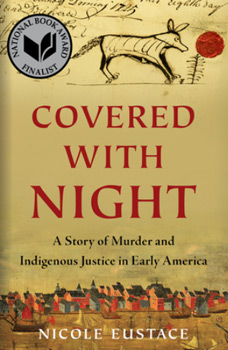
A Story of Murder and Indigenous Justice in Early America
by Nicole Eustace
An immersive tale of the killing of a Native American man and its far-reaching implications for the definition of justice from early America to today.
On the eve of a major treaty conference between Iroquois leaders and European colonists in the distant summer of 1722, two white fur traders attacked an Indigenous hunter and left him for dead near Conestoga, Pennsylvania. Though virtually forgotten today, this act of brutality set into motion a remarkable series of criminal investigations and cross-cultural negotiations that challenged the definition of justice in early America.
In Covered with Night, leading historian Nicole Eustace reconstructs the crime and its aftermath, bringing us into the overlapping worlds of white colonists and Indigenous peoples in this formative period. As she shows, the murder of the Indigenous man set the entire mid-Atlantic on edge, with many believing war was imminent. Isolated killings often flared into colonial wars in North America, and colonists now anticipated a vengeful Indigenous uprising. Frantic efforts to resolve the case ignited a dramatic, far-reaching debate between Native American forms of justice―centered on community, forgiveness, and reparations―and an ideology of harsh reprisal, unique to the colonies and based on British law, which called for the killers' swift execution.
In charting the far-reaching ramifications of the murder, Covered with Night―a phrase from Iroquois mourning practices―overturns persistent assumptions about "civilized" Europeans and "savage" Native Americans. As Eustace powerfully contends, the colonial obsession with "civility" belied the reality that the Iroquois, far from being the barbarians of the white imagination, acted under a mantle of sophistication and humanity as they tried to make the land- and power-hungry colonials understand their ways. In truth, Eustace reveals, the Iroquois―the Six Nations of the Haudenosaunee, as they are known today―saw the killing as an opportunity to forge stronger bonds with the colonists. They argued for restorative justice and for reconciliation between the two sides, even as they mourned the deceased.
An absorbing chronicle built around an extraordinary group of characters―from the slain man's resilient widow to the Indigenous diplomat known as "Captain Civility" to the scheming governor of Pennsylvania―Covered with Night transforms a single event into an unforgettable portrait of early America. A necessary work of historical reclamation, it ultimately revives a lost vision of crime and punishment that reverberates down into our own time.
"[Eustace] reveals forgotten treasures in America's attic...formally documenting a more humane, healing vision of what justice could be – and once was – in this country." - Chicago Review of Books
"The story has countless moving parts and one central mystery that demand subtle exposition, and Eustace navigates it all with skill and economy. A fine contribution to the literature of Colonial America, where peace was far harder to achieve than war." - Kirkus Reviews (starred review)
"Throughout, she makes excellent use of primary sources to convey the sophisticated rhetorical strategies of Native negotiators. Early American history buffs will be fascinated." - Publishers Weekly
"Relying on primary sources, including colonial writings, Eustace's account offers not only the history of the trial, but also an inclusive examination of ongoing clashes over the possession of land rights. Black-and-white illustrations of colonial letters throughout add context." - Library Journal
"Listening keenly and insightfully to Native voices in colonial records, Nicole Eustace deftly recovers a revealing tale of murder and justice across a cultural frontier at a critical moment for the future of our continent. A great read and an important book." - Alan Taylor, Pulitzer Prize–winning author of Thomas Jefferson's Education
"Nicole Eustace crafts a thoroughly original and compelling account of eighteenth-century America, its volatile societies and cultural boundaries, and especially the conflicts between Native people and colonial newcomers over how justice itself might be defined in America. Her answers are surprising, enlightening, and worthy of rediscovery." - Matthew Dennis, professor emeritus of history at the University of Oregon and author of Seneca Possessed: Indians, Witchcraft, and Power in the Early American Republic
This information about Covered with Night was first featured
in "The BookBrowse Review" - BookBrowse's membership magazine, and in our weekly "Publishing This Week" newsletter. Publication information is for the USA, and (unless stated otherwise) represents the first print edition. The reviews are necessarily limited to those that were available to us ahead of publication. If you are the publisher or author and feel that they do not properly reflect the range of media opinion now available, send us a message with the mainstream reviews that you would like to see added.
Any "Author Information" displayed below reflects the author's biography at the time this particular book was published.
Nicole Eustace is professor of history at New York University. She is the author 1812: War and the Passions of Patriotism and Passion Is the Gale: Emotion, Power, and the Coming of the American Revolution. She lives in Mamaroneck, New York.
I always find it more difficult to say the things I mean than the things I don't.
Click Here to find out who said this, as well as discovering other famous literary quotes!
Your guide toexceptional books
BookBrowse seeks out and recommends the best in contemporary fiction and nonfiction—books that not only engage and entertain but also deepen our understanding of ourselves and the world around us.